So you want to try camping but have zero clue where to start? Trust me, I get it. The thought of sleeping outside with nothing but a thin piece of fabric between you and whatever’s lurking in the woods can feel pretty intimidating. But here’s the thing – camping doesn’t have to be scary or complicated. I remember my first camping trip was a complete disaster (think soggy sandwiches and a tent that collapsed at 2 AM), but it taught me everything I needed to know for future adventures.
Choose Your Camping Style First
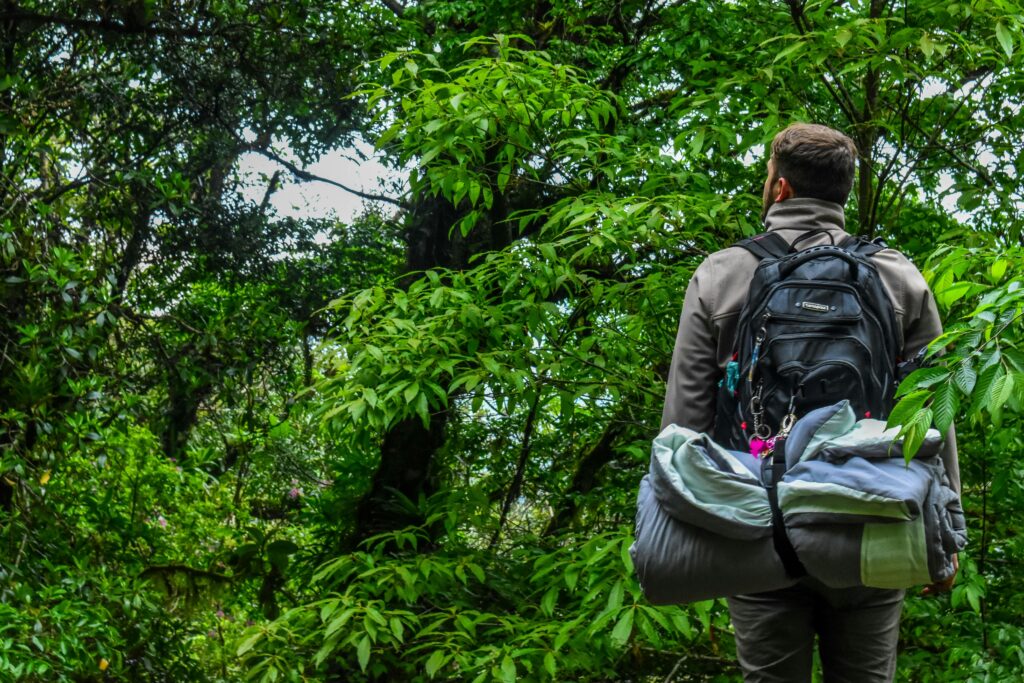
Before you start buying gear like you’re preparing for the apocalypse, figure out what type of camping actually appeals to you. Are you the type who wants to rough it completely, or do you prefer having a bathroom within walking distance?
Car Camping vs. Backpacking
Car camping is perfect for beginners because you can bring all the comfort items your heart desires. You park right next to your campsite, unload your gear, and set up camp. No hiking required – just pure convenience.
Backpacking means you carry everything on your back and hike to your campsite. It’s more adventurous but definitely more challenging. Save this for when you’ve got a few car camping trips under your belt.
Developed Campgrounds vs. Dispersed Camping
Developed campgrounds offer amenities like: • Restrooms and shower facilities • Picnic tables and fire rings • Potable water sources • Sometimes even electrical hookups
Dispersed camping (also called boondocking) means camping in undeveloped areas with zero amenities. It’s free but requires more preparation and self-sufficiency.
For your first trip, stick with a developed campground. Trust me on this one – you’ll thank me when you need to use the bathroom at 3 AM 🙂
Pick Your Location Wisely
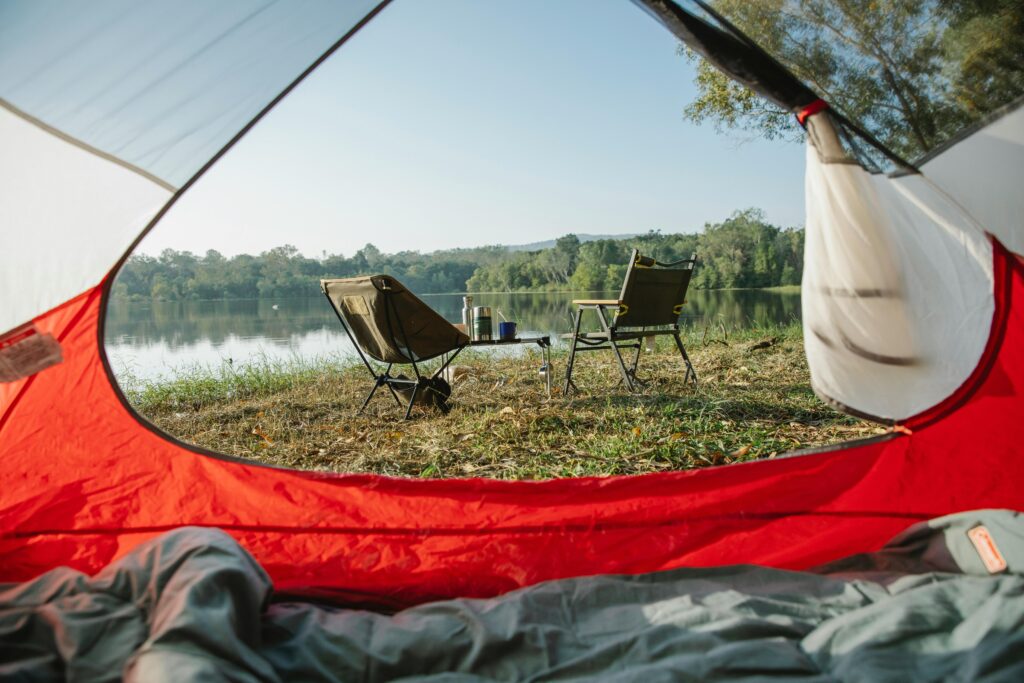
Ever wonder why some people love camping and others swear they’ll never do it again? Location makes or breaks the experience.
Start Close to Home
Choose a campground within two hours of your house for your first trip. If something goes wrong or you forget essential gear, you can easily head home. Plus, shorter travel time means more time enjoying the outdoors.
Research Your Campground
Before booking, check out: • Reviews on camping websites and apps • Available amenities and facilities
• Activities nearby (hiking trails, lakes, etc.) • Weather patterns for your planned dates • Cell phone coverage (just in case)
I always read recent reviews because they give you the real scoop on what to expect. Sometimes that “beautiful lakeside campground” turns out to be next to a construction zone.
Essential Gear for Beginners
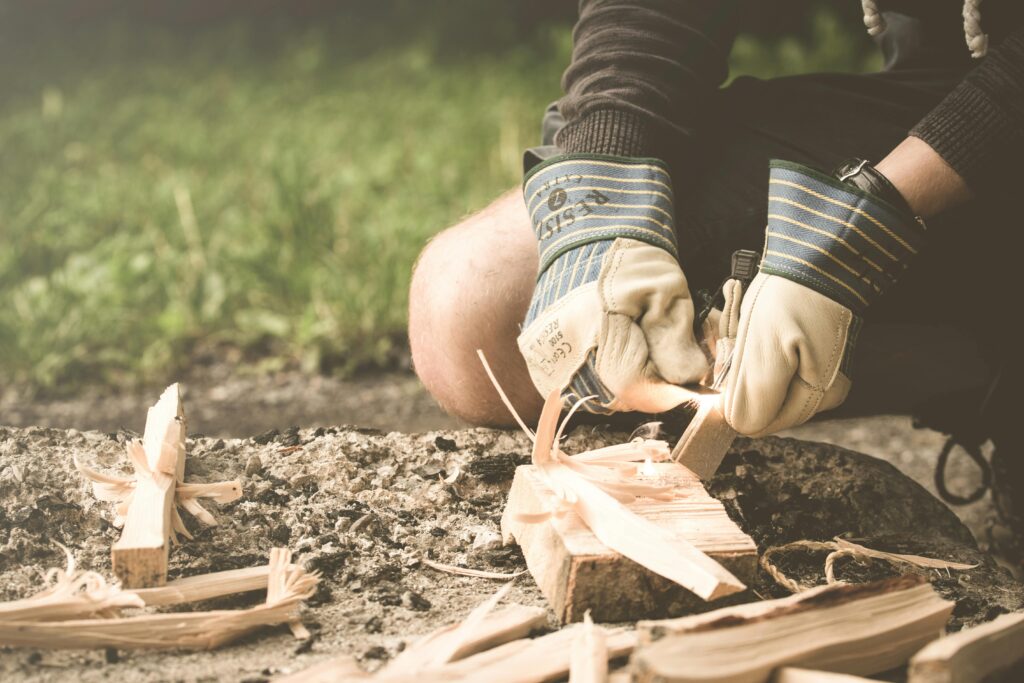
Here’s where people usually go overboard and buy everything REI sells. Don’t be that person. Start with the basics and build your gear collection over time.
The Big Three: Shelter, Sleep, Food
Shelter: Your tent is your fortress against the elements. For beginners, I recommend a simple dome tent for 2-4 people. Look for: • Easy setup (preferably color-coded poles) • Decent weather resistance • Vestibule space for gear storage
Sleep System: You need three things: a sleeping bag, sleeping pad, and pillow. The sleeping pad is crucial – it insulates you from the cold ground and provides cushioning. Don’t skip this unless you enjoy waking up feeling like you wrestled a bear.
Food Prep: A basic camp stove, fuel, cookware, and cooler will handle most meal situations. Start simple with one-pot meals and snacks that don’t require refrigeration.
Don’t Forget the Small Stuff
The little things can make or break your trip: • Headlamp (hands-free lighting is a game changer) • First aid kit (because Murphy’s Law applies to camping) • Multi-tool or knife • Rope or paracord • Trash bags (leave no trace, people!) • Toilet paper and trowel • Insect repellent and sunscreen
Plan Your Meals Like a Pro
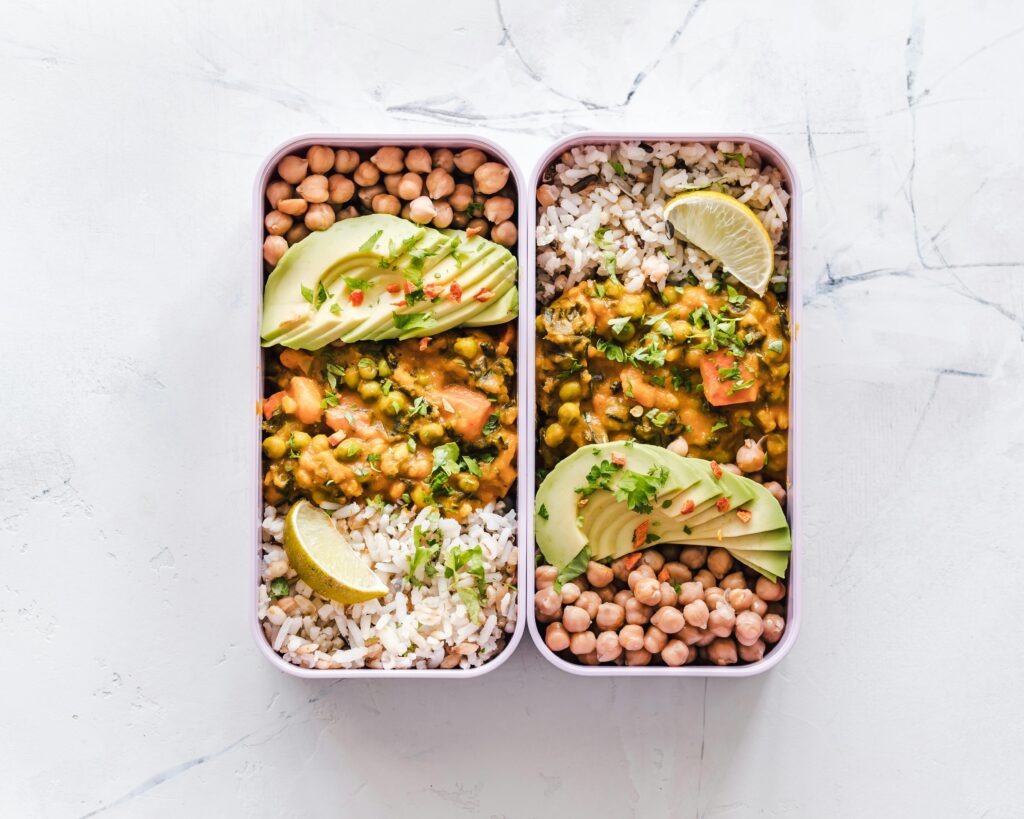
Camping food doesn’t have to be fancy, but it should be filling and easy to prepare. Nobody wants to spend their entire vacation cooking over a camp stove.
Breakfast Ideas
Keep it simple with options like: • Instant oatmeal with dried fruit • Bagels with peanut butter • Pre-cooked bacon and eggs • Granola bars and coffee
Lunch and Dinner Strategy
One-pot meals are your best friend. Think pasta dishes, stir-fries, or chili that you can prep at home and just heat up at camp. Pre-cut vegetables and pre-marinate proteins to save time and hassle.
Pack extra snacks – trail mix, jerky, crackers, and fruit. You’ll get hungrier than usual with all that fresh air and outdoor activity.
Water Situation
Bring more water than you think you need, especially if your campground doesn’t have potable water. One gallon per person per day is a good starting point for drinking, cooking, and basic hygiene.
Master the Art of Campsite Setup
Setting up camp efficiently makes everything else easier. I learned this the hard way during a rainstorm when I was still figuring out which pole went where.
Choosing Your Spot
If you have multiple site options, look for: • Level ground for your tent • Natural windbreaks like trees or rocks • Good drainage (avoid low spots that collect water) • Morning shade (nobody wants to wake up in a solar oven)
Setup Order That Works
- Set up your tent first – this gives you a home base
- Organize your kitchen area with stove, cookware, and food
- Create a comfortable seating area around the fire ring
- Hang a bear rope or use bear canisters for food storage (if required)
Fire Safety and Etiquette
Check fire restrictions before your trip. Some areas ban fires during dry seasons. When fires are allowed: • Only use provided fire rings • Keep fires small and manageable • Never leave a fire unattended • Completely extinguish before leaving or sleeping
Weather Preparation and Backup Plans
Weather can change quickly outdoors, and Mother Nature doesn’t care about your camping plans. Always check the forecast and prepare for conditions that are 10-15 degrees colder than predicted.
Layer Your Clothing
Forget cotton when camping – it stays wet and makes you cold. Pack: • Moisture-wicking base layers • Insulating middle layers (fleece or down) • Waterproof outer shell • Extra socks and underwear
Have a Backup Plan
What if it rains for three straight days? FYI, this happens more often than you’d think. Pack: • Cards or travel games • Good books or e-readers • Portable phone chargers • Comfortable camp chairs for hanging out under shelter
Safety Considerations for New Campers
Camping is generally safe, but being prepared prevents most problems before they start.
Wildlife Awareness
Research what animals live in your camping area. Most wildlife avoids humans, but proper food storage prevents unwanted visitors. Bears, raccoons, and other critters have learned that campsites equal easy meals.
Tell Someone Your Plans
Always inform a trusted friend or family member about: • Where you’re camping • When you’re leaving and returning • Your planned activities • Emergency contact information
Pack a Comprehensive First Aid Kit
Include basics like bandages, antiseptic, pain relievers, and any personal medications. Know how to treat common camping injuries like cuts, burns, and insect bites.
Making Your First Trip Memorable (For Good Reasons)
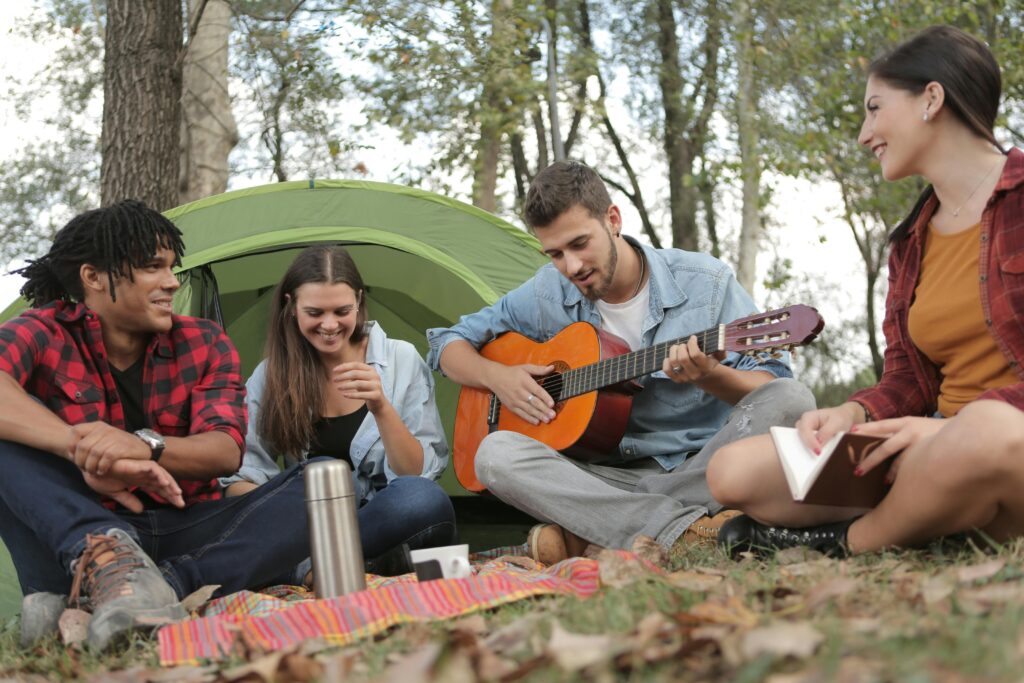
Your first camping experience sets the tone for future adventures, so stack the deck in your favor.
Start With Good Weather
Plan your trip during mild weather with minimal chance of storms. Spring and fall often offer the best conditions – comfortable temperatures and fewer bugs.
Bring Entertainment
Camping isn’t just about survival – it’s about enjoying nature and disconnecting from daily stress. Pack: • Binoculars for wildlife watching • Star chart for nighttime sky gazing • Frisbee or other outdoor games • Journal for recording memories
Embrace the Imperfections
Something will go wrong – that’s guaranteed. Maybe your tent zipper breaks, or you burn dinner, or it rains when the forecast called for sunshine. These mishaps become the best stories later, so roll with them and maintain your sense of humor.
Final Thoughts: You’ve Got This
Camping for beginners doesn’t require a PhD in outdoor survival. Start simple, be prepared, and remember that every experienced camper was once exactly where you are now – slightly terrified but excited about sleeping under the stars.
The goal isn’t to become Bear Grylls overnight. It’s to spend quality time outdoors, disconnect from screens, and maybe rediscover what it feels like to be genuinely tired from fresh air and physical activity instead of work stress.
Your first camping trip won’t be perfect, and that’s perfectly okay. What matters is taking that first step outside your comfort zone. Pack your sense of adventure along with your sleeping bag, and prepare for an experience that might just change how you think about the great outdoors. Who knows? You might even find yourself planning trip number two before you’ve finished unpacking from trip number one.

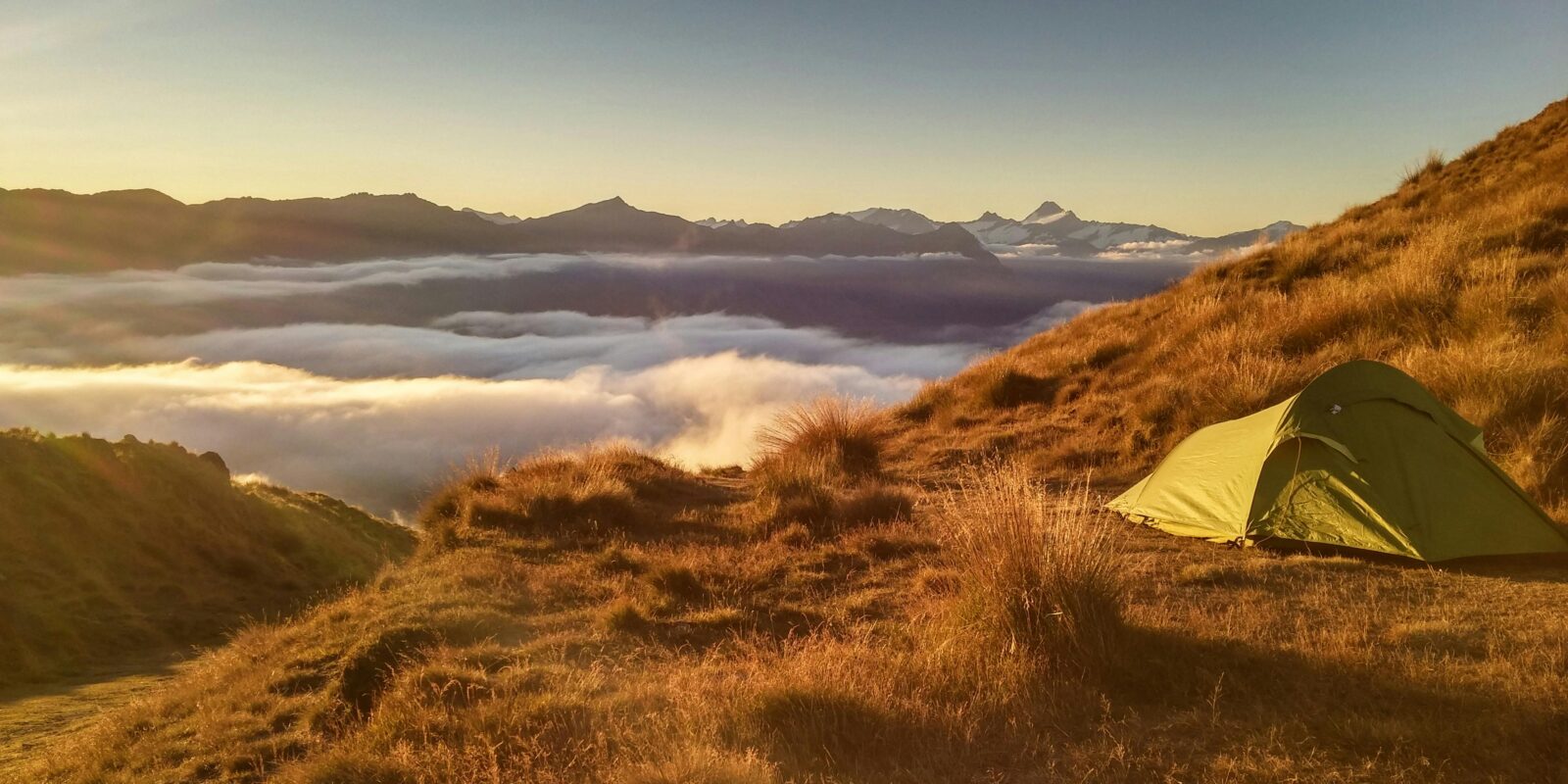

Leave a Reply